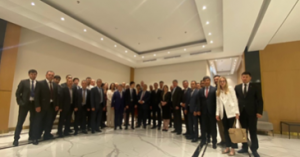Mining is an important sector and economic contributor in Central Asian countries due to their rich mineral base. However, the mining activities also generate huge amount of waste which can contain hazardous substances and must be safely stored in so-called tailings management facilities (TMFs). The expected global increase in the demand for minerals and metals will also translate in an increase in tailings management facilities, bringing risks to the environment and populations. In addition, countries of Central Asia are prone to natural disasters, which could provoke technological accidents, so-called Natech accidents. Tailings accidents can easily result in transboundary pollution as the Central Asian countries are interconnected not only through their land borders, but also through a network of transboundary rivers such as the Syr Darya and the Amu Darya.
This means that prevention of and preparedness for technological and natural disasters as well as accidental water pollution, require special attention in this region. To help address these risks, a UNECE and partners organized a subregional workshop on strengthening mine tailings safety and prevention of accidental water pollution in Dushanbe (Tajikistan) and online on 25-26 May. The meeting brought together high-level representatives from Central Asian countries from authorities dealing with the prevention, preparedness and response to industrial accidents and accidental water pollution, which demonstrated their desire to develop a common regional approach.
To support these efforts, UNECE's Convention on the Transboundary Effects of Industrial Accidents works with Central Asian countries, under the Assistance and Cooperation Programme, to enhance mine tailings safety and the prevention of accidental water pollution. Guidance like the UNECE Safety Guidelines and Good Practices for Tailings Management Facilities, a related checklist methodology and the Online Toolkit on Strengthening Mine Tailings Safety are practical tools that countries within and beyond the UNECE region can apply.
"The Convention on the Transboundary Effects of Industrial Accidents has successfully proven to be an effective instrument in the system of international relations. The relevance of the Convention for Kazakhstan is beyond doubt", stressed Mr. Mereke Pshembaev, the Vice-Minister of Emergency Situations of Kazakhstan.
Ms. Sharifa Khudobakhsh, Deputy Minister of Energy and Water Resources of Tajikistan and Mr. Mukhtar Mukhitdinov, Deputy Minister of Emergency Situations of Uzbekistan, pointed out the importance and need to further strengthen transboundary cooperation and develop joint contingency plans, notably in river basins, in Central Asia. Indeed, transboundary cooperation between Central Asian countries is key to building resilience and preventing industrial accidents and accidental water pollution. In response, Kazakhstan suggested establishing a joint working group on monitoring/control of the transboundary TMFs in Central Asia. Mr. Ardasher Mirzozoda, First Deputy Chairman of the Service of the State Supervision of Safe Work in Industry and Mining Supervision under the Government of Tajikistan, further emphasized the importance of strengthening transboundary cooperation, good practices and knowledge between all Central Asian countries.
Mr. Dosbol Bekmaganbetov, Vice-Minister of Natural Resources of Kazakhstan, highlighted that the risks of water and environmental pollution resulting from potential accidents at industrial facilities, particularly tailings dams, are of serious concern. In addition, the negative impact of climate change and the exposure of Kazakhstan's territory to extreme weather events and natural disasters are increasingly noticeable.
Since the last subregional workshop, held in Almaty in 2019, UNECE, together with its partners, has continued to build the capacities of Central Asian countries in the field of industrial accident prevention through a number of assistance projects on strengthening mine tailings safety in Kazakhstan (2018-2019), Tajikistan (2019-2020), Central Asia (2020-2023) and Uzbekistan (2021-2023), funded by the Swiss Federal Office for the Environment.
The workshop reviewed the results of a project on "Development of joint measures to prevent and respond to pollution of the Syr Darya River in emergency situations (Phase I)". The participants agreed on the need to develop a joint contingency plan in emergency situations in the Syr Darya River Basin. Mr. Mavlon Hokimalizoda, Executive Committee IFAS, Representative of Tajikistan highlighted the need to implement the second phase of the project.
In addition to the high-level attendance, the workshop brought together expert-level representatives from industrial safety and water authorities from Kazakhstan, Kyrgyzstan, Tajikistan, Turkmenistan and Uzbekistan, operators, NGOs, academia and international organizations. It allowed for a transparent dialogue and exchange of opinions between different stakeholders on the most pressing challenges and needs related to tailings safety and preventing accidental water pollution in Central Asia and the measures to be taken in this respect. Creating a coordination council to explore the potential risks related to hazardous activities, additional inspections/controls at the TMFs, capacity-building of staff and enhancement of the legislation were among the needs highlighted. It was also suggested to launch a pilot project on assessing climate change impacts on tailings safety in Central Asia.
The subregional workshop was organized under the UNECE Convention on the Transboundary Effects of Industrial Accidents, in cooperation with the Government of Tajikistan and with financial support from the Swiss Federal Office for the Environment, GIZ, OSCE, and the United Nations Regular Programme of Technical Cooperation. This is part of the implementation of the UNECE Project on strengthening mine tailings safety in Central Asia and the Project on strengthening tailings safety and the prevention of accidental water pollution in Uzbekistan and beyond in Central Asia.


